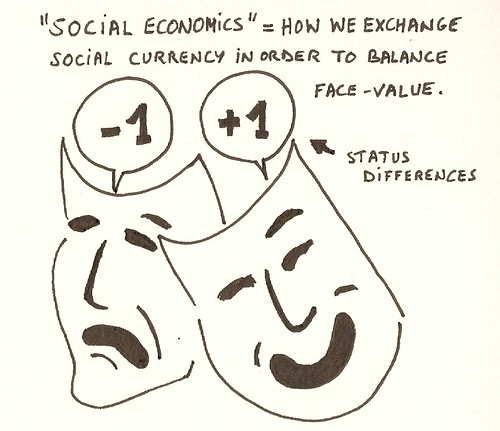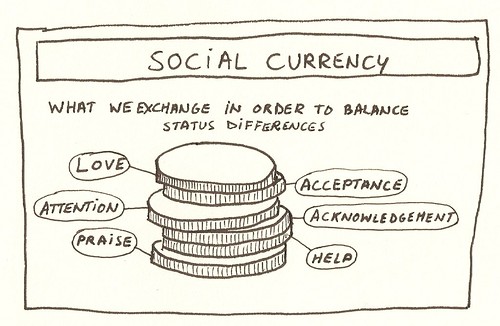In a previous post I wrote how every interaction between human beings can be viewed as social theatre on the one hand and social economics on the other hand. The situation we are in determines the roles we play and the rules we follow; and we reciprocate every request with a response.
In this post I want to have a closer look at the exchange of requests and responses. What exactly is being exchanged in order to maintain or regain the balance? And what is it exactly that needs to be balanced?
Face Value
Let’s start with the second question: what is that thing that we are so desperately balancing all the time? It is called face-value. Face-value is the status that we claim to uphold for ourselves in a given situation. If we are in a hospital where I am a doctor and you are the patient, I can claim a certain status that is higher than yours. But you may be a lawyer and the next day we may be in court where you are defending my case. In that particular situation you can claim a higher status.
In both of the above situations the status differences are clear and both of us will have no problem granting one another the face-value we deserve. The value comes with the situation and it is scripted in our roles. And now over to the interesting part: how this value is exchanged – because the process of reciprocation requires that we confirm the face-value that is being claimed.
Social Transactions
When we look a little closer, we can see that virtually all human interactions can be decoded into +1 and -1, i.e. an increase or a decrease in status. When I ask for help I put myself on a “-1” level and thereby create a tension that needs to be solved through a transaction of social currency. This can either be an answer or an acknowledgement that puts the situation back into balance.

Another option could be that the other person embarrasses me by laughing at my question. This puts me in a “-2” position and the tension increases. What was given and received is out of balance. Edgar Schein notes in this respect:
When social exchanges don’t work properly because the two people involved define the situation differently the result is anxiety, tension, anger, discomfort, embarrassment, shame and/or guilt. When this happens, the resolution of this tension can only be solved when one of the parties has discovered the inequity and has rebalanced the situation with an explanation, an apology or a belated thank-you.
In real life – and on television – there is a word for this imbalance. It’s called drama, and it makes the world go round. Drama is what makes movies win Oscars, what keeps us awake at night, and it is also why humans are the only animals who kill their own kind. The Greeks knew that when they invented theatre: the tension that builds up through the status differences triggers an urge in all human beings to restore the balance.
Social Currency
Now let’s have a closer look at the social currency that is exchanged in order to confirm the face-value that is claimed by someone in a given situation. It is: love, attention, praise, acceptance, acknowledgement and help. Exchanging these currencies when they are claimed puts the situation back into equilibrium because the face-value that is claimed is being paid for.

Looking back at the example of the other person who embarrasses me by laughing at my question, it is clear that this person is pulling me ‘one-down’ by withdrawing instead of granting me the value / justification that I claim with my question. Notice how this works in ordinary conversation:
- if you do not pay attention;
- if you start a side conversation;
- if you look over the person’s shoulder at someone else who is more interesting to you at that moment;
- if you yawn;
- if you interrupt with ‘I already knew that’;
- if you use a disinterested tone of voice
These are all behaviors that disrupt the building of a relationship. This brings us to a next topic: trust and the emotional bank account.
The Emotional Bank Account
Trusting another person means that no matter what we choose to reveal about our thoughts, feelings or intentions, the other person will not belittle us, make us look bad or take advantage of what we said in confidence. According to Edgar Schein this happens as follows:
We build and deepen relationships through cycles of testing and response.
Stephen Covey uses the metaphor of a financial bank account into which you can make deposits and take withdrawals. The currency of this bank account is social currency, so its statements tell us something about the relationship you have with your friends, family, associates, customers, etc. The most important of all deposits into the emotional bank account is empathy. Covey defines empathy as: listening to another person within his or her frame of reference. If you pay attention and show your interest you are building the relationship and making deposits on that account.
So now we know that face-value is important and that if it is not granted in a situation the relationship suffers. We also have a way to think about the value of the relationship in terms of an emotional bank account. The issue at hand is trust and it is related to how well we are measuring and confirming the face-value in a given situation.



